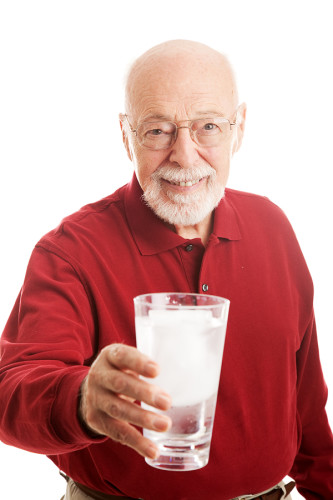Despite having performed just months earlier, on May 14, 2015, BB King passed away while on hospice care. A few weeks before, he was in the hospital fighting dehydration, a condition that had been made worse by his diabetes. Clearly, if BB King—who had the money and family support to get the best care—became dehydrated, any senior can.
Medication intake, forgetfulness and the lowering of body water content that comes with age all make dehydration more common in the senior population. According to Britain’s Royal Society of Medicine (RSM) those with dementia were six times more likely to be dehydrated and one out of four seniors without a senior home care provider show signs of dehydration. Recognized as one of the top ten causes of senior hospitalization, dehydration can also underlie serious health events including confusion, falls and serious constipation in our elderly population.
For such an inexpensive resource, water does a world of good, particularly for seniors. Researchers tells us proper hydration has the following benefits:
- increased heart health and function: the heart of a person with fully hydrated blood doesn’t have to work as hard.
- lowered stress: the brain is 85% water. Deprive it and mood-impacting chemicals get out of balance.
- increased energy: water transports oxygen and nutrients to cells.
- prevention of muscle cramping and joint pain. Water is body lubrication!
- improved digestion.
Despite these benefits, many seniors don’t drink the 8 glasses a day doctors recommend. That amount is difficult for people of any age to consume!
Complicating water intake for seniors is the fact that their sense of thirst may be diminished. They also may be taking medications that have dehydrating effects (diuretics). With dehydration an ever-present threat, particularly in the summer in San Diego’s desert climate, the senior home care provider must know both the signs of senior dehydration as well as how to keep the client drinking throughout the day.
Signs of Dehydration in Seniors
Signs of dehydration that everyone, including the senior home care provider must understand, include:
- increased tiredness
- loss of appetite
- dizziness
- nausea and vomiting
- increased heart rate
- nose and mouth dryness
- constipation
- skin tenting
- severe confusion
While drinking water can alleviate some dehydration, severe cases must be treated at a hospital.
Tips that Help Seniors Stay Hydrated
First, convince yourself or your loved one that dehydration has serious consequences. Adequate water intake prevents all kind of physical miseries, including sitting in a cold gown in an emergency room waiting for the doctor.
Our caregivers have found that buying flavored waters, seltzer water and low calorie juices makes water intake more appealing. They’ve even “infused” water with cucumbers, pineapple, lemon slices and/or mint by putting slices of these in a pitcher of water and leaving overnight in the refrigerator. Having portable sports bottles handy for continuing water intake on the run also keeps everybody hydrated throughout the day.
Love 2 Live Senior Home Care Providers Understand the Threat of Dehydration
When we come to talk to you about your needs during your free, no-obligation in-home assessment, you can explain whether you or a loved one is prone to dehydration. Our caregivers are all trained in dealing with this issue. Further, many of our senior home care providers have advanced training and experience in managing diabetes, heart disease, COPD, dementia, Alzheimer’s and more issues common in elderly populations. Most importantly, they have learned thoroughly how to follow the healthcare team’s instructions. Questions? Don’t hesitate to call us at 619-291-4663 today!